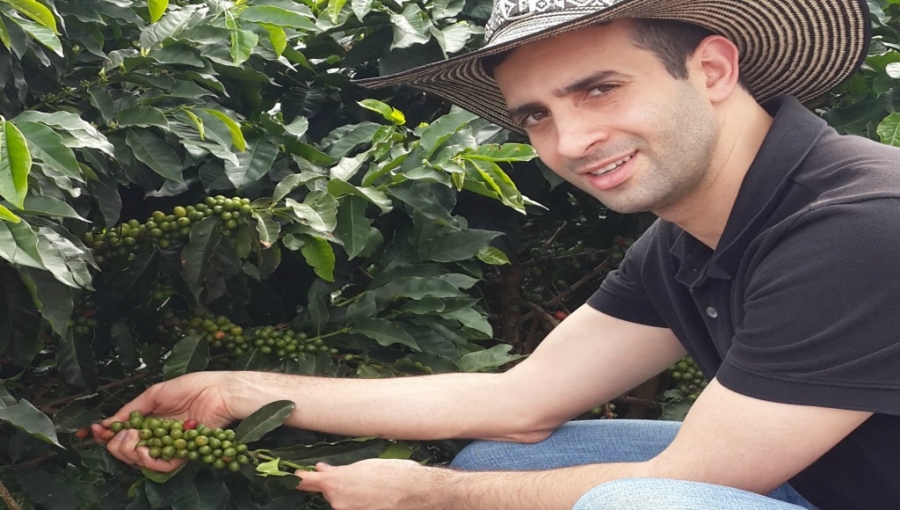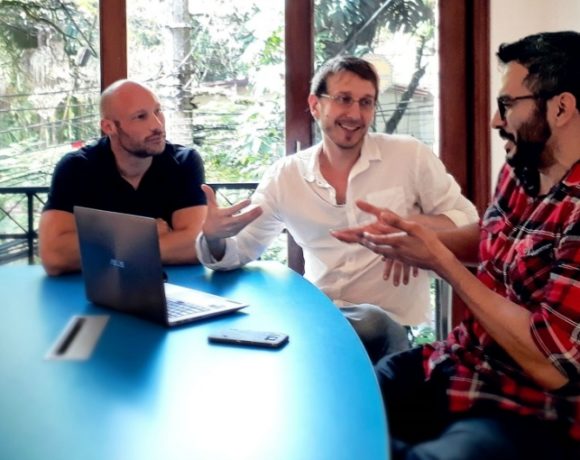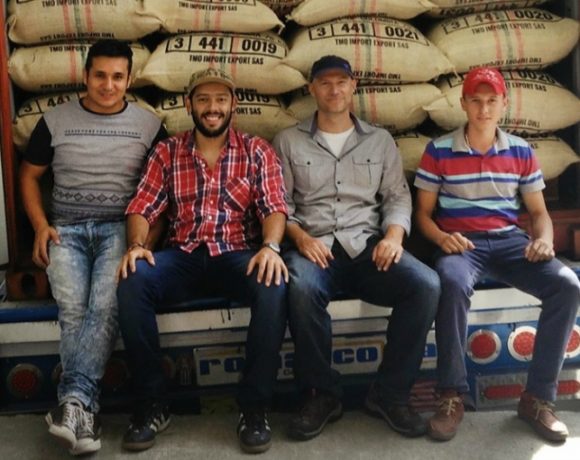Bringing Light to the World, ‘Smart’ Investment to Colombia: Chagai Stern

Thirty-six-year-old Israeli expat Chagai Stern came to Medellin three years ago, riding a comet that has carried him to the heights of fame, fortune and friendships with some of the world’s biggest movers-and-shakers.
Now, together with a New York partner, he’s putting part of his fortune and friendships to work for the advancement of Colombian agriculture, through his “Iscol Investments” holding company.
The new investments in farms – typically employing the most advanced Israeli technologies and practices — aren’t designed for personal aggrandizement, quick-bucks or Midas-like fortunes.
Rather, Stern aims to continue pursuing life-long goals: building sustainable, smart and ethical businesses, while simultaneously showing others how to do the same – thus complying with the heavenly commandment that the Israelites must bring light to the nations.
Stern is a devout Orthodox Jew who co-founded with Felipe Ariel Barragan the growing, international Jewish Community Center (JCC) here in Medellin.
As told to Medellin Herald in an interview at his modest Poblado apartment, Stern explained that “my business has to do good, not just make money.”
“You don’t get judged on what you own, but rather on what you’ve done,” Stern explained. “Success and results are solely in the hands of God. All what we have to do is our maximum efforts.”
There’s nothing flashy or pretentious about Stern – not in the way he dresses, nor the way he lives, not how he carries himself, nor the way he travels. Even sleep time is a modest three hours per night, because “I don’t want to waste a second here,” he said.
This modest way of living has served him well, and has won him many friends – a pattern that has played-out over-and-over again, with results that would astonish most people.
Early Years: USA-to-Israel
Born in 1980 and following a childhood in Brooklyn, New York, a 14-year-old Stern moved with his family to Israel, where he continued his studies and eventually graduated from university with degrees in economics, logistics, law and a master’s in business administration.
Following three years’ mandatory service in the Israel Defense Forces (IDF), Stern was asked by a family friend that he knew from his time in the USA to work as deputy director at an Israeli “youth village” farm-orphanage that had been poorly managed, with deep financial troubles.
Turning down other opportunities to launch a business career, Stern instead took-up the challenge of helping to turn-around the fortunes of the farm-orphanage – a job that paid only minimum wage, and with sleeping accommodations in a “moldy room” that had been judged to be unfit for the children there.
But meager wages and poor sleeping quarters were only the start of challenges, Stern explained.
“I was the youngest deputy director and by far the youngest worker in the youth village — and the older people working there ignored anything I asked them to do,” he said. “I had to find a way for them to listen to me without using my power of authority. I had to prove myself as a worthy manager to gain their respect.
“So, I came up with a plan for a fund-raising event, and organized it, and it became a big event, drawing 600 people from all over the country, including my parents. One of the workers told me that she had been working there for over 30 years and had never seen so many foreigners and dignitaries coming into the village. From that day on, I had everyone’s full attention.”
That event not only helped overcome the village’s financial problems, but also it taught Stern valuable lessons about networking, organizing and development.
European Ventures
Later on, Stern moved to Brussels, Belgium, where he eventually became head of the European Center for Jewish Students (ECJS) organization.
“The organization grew from around 1,000 members when I arrived, to 30,000 students, becoming the largest student organization in Europe,” he said.
Tapping financial support for ECJS from several wealthy European Jews, Stern then dramatically expanded the group’s reach and mission.
He also helped with the founding of the pro-Israel lobby in the European Parliament — European Friends of Israel (EFI) — and the Europe Israel Press Association (EIPA), where he continues to be involved in its activities.
Those networks helped Stern land a post as general consultant for Centrum Development and Investment (CDI), one of the largest commercial real estate companies in Poland, and as international consultant for Empik, Media & Fashion (EMF), the largest non-food retail company of Central and Eastern Europe. Stern also privately represented several large companies in Israel and abroad at the time.
Numerous efforts in international philanthropy and political defense of Israel followed. For example: In 2010, Stern served as Israeli chief of staff for an EFI policy conference that brought 400 European Parliament members and decision-makers to Israel.
These business and political experiences also helped him expand his business-to-government and (later) investor-to-entrepreneur “matchmaker” services, both of which eventually proved to be very profitable.
“When I was 26 years old, I was advising government ministers in Former Soviet Union countries on privatization of state industries,” he explained.
“I moved to Poland, where I lived for one-and-a-half years. The more government people I brought to the table [to meet investors], the more business people came to me,” and as a result the matchmaking/consulting business eventually spread beyond Europe, where Stern came to know both political presidents and private-sector high-rollers.
One such contact that he met in 2008 was the Countess Esther de Pommery, the Swiss-born director of numerous charitable organizations, including the Esther de Pommery Comtesse de Lambrey Foundation.
Together, Stern and the Countess founded the “Israel to the Nations Foundation,” which donated over a three-year period more than US$500 million “in the name of Israel” for numerous hospitals and orphanages in Europe, Israel and Africa.
Colombia Move
Stern initially came to Colombia only temporarily, as vice-chairman of an oil and gas company. But once he discovered the rich potential of Colombia’s natural resources, he decided to relocate permanently — and put most of his business focus on the agriculture sector.
However, Stern soon realized that farmers here often make the least money in the food chain.
Following a meeting with a veteran coffee grower here — who revealed considerable losses of money in the business — Stern discovered that on average, from 11 to 17 middlemen separate the grower from the consumer. Green coffee that a Colombian grower sells for US$2 per kilo could cost up to US$72 for the consumer.
Seeing an opportunity to build a more-ethical business that’s fairer to the farmer, Stern, who (ironically) doesn’t drink coffee, opened coffee warehouses in Holland and Poland, and started to export directly.
But while coffee growers in Colombia might benefit from business models that enable a greater, fairer share of the net profits, they also need to improve their own business practices — including more-accurate measurement systems, more-accurate and timely deliveries, better command of English for business communications, and better financial practices, he learned.
Too often, “business practices here are outdated, and people take zero risks. They don’t like to be the first to try anything, and instead just repeat common practices,” Stern said.
“For example, I recently visited to a big ranch here, and they didn’t think of drilling a well and installing irrigation systems to improve grass production during dry seasons. As a result, they could only support 300 cows on a ranch that could easily support 3,000.
“I learned this from Israeli experts who know all about cattle raising on arid land. Now, I’m building air-conditioned stables for cows at a model farm in Medio Magdalena.
“Israel, a country with little land and almost no natural resources, produces an average of 45 liters of milk per day per cow. But in Colombia, a country where everything grows naturally, the average production is only six to seven liters per cow per day.
“That’s because of a lack of technology and good practices. In Israel, dairy producers trace every cow’s genetics going back seven generations, but that doesn’t happen here.
“For meat production, cattle in Israel can gain up-to-two-kilograms-per-day in weight, so it only takes 10 months to slaughter, compared to two years in Colombia.
“The secrets [to improve production] are genetics and environment. Cows don’t like to walk, they need shade, they need good food and they need protection from ticks and flies. Grazing is not good enough. They also need nutritious corn and silage.
“In Israel, there is a special bracelet attached to cows, which results in the cow walking differently when she’s in heat – a better system than what’s used in Colombia. And all my cows here in Colombia will have special necklaces with transmitters, which will detect and transmit data to a central computer showing whether they’re eating enough. That way you can adjust their food intake, depending upon each cow’s needs and profitability.”
Colombia Demonstration Farm
“On the demonstration farm we are currently developing here, it will have advanced Israeli technologies – the most productive and profitable technologies and practices,” Stern explains.
“While this farm will be profitable, it’s also going to be a demonstration farm, to show people how to do this properly. When this farm begins commercial operation, we’ll have tours, lectures and demonstrations.
“It’s the same story with growing vegetables. Israel is number-one in the world in technical development and irrigation and genetics.
“That’s why I’ve formed a new company that imports Israeli technology to Colombia, with products that can help both humans and animals. For example, we can kill parasites [that afflict animals] without toxins. We have a product that kills Zika larvae without harming fish. We also have water and electricity solutions for remote areas. Israel is a powerhouse of solutions.
“Colombia desperately needs to internationalize [its economic model] and Israel is desperately looking for new friends, because of an increasingly hostile, anti-Israel political climate in Europe.
“So, Israel is looking at making new partnerships in Asia, India and Latin America, and Colombia has the most potential in all of Latin America, especially in agriculture.
“Look at what is happening in the world today: people’s lives are longer, we eat more today than our counterparts did 20 years ago, and China alone with 1.2 billion people is consuming more and looking for more sources for import. India is acquiring more food, but there’s only so much productive land in the world.
“I believe that in the next five years, there will be a big shift in investment toward food production, and Colombia would become an empire in agriculture over the next five-to-10 years. For example, Tilapia is a very interesting business that my partner and I are looking into.
“Colombia also could triple its citrus and strawberry production using new solutions to bacteria control.
“When Colombia becomes an agricultural powerhouse, I think the Colombian peso will go back to around 2,000 pesos to the dollar. So now is a good time to invest in farmland. Colombia is the cheapest and best place to do it, and it’s not as dangerous to buy or operate as in Africa. However, there are so many laws and regulations, so you need to do your homework,” he added.
Business Advice
“Regulations here in Colombia are complicated, but relatively friendly to foreign investment. For instance, you can repatriate capital here, but not in some other countries,” Stern explained.
“One of the biggest problems here is that the banking system is really terrible, so it makes more sense to bring capital from the USA or elsewhere.
“As for dealing with all the rules and regulations, you need good local team. That’s the first thing I do prior any investment is to find a good lawyer and a team.
“Right now I’m meeting with interested investors here about twice or three times a week, guiding them on the first steps of doing business.
“At the end of the day, we are living in one world. The more we share information, the better chance we have to make new developments and discoveries. I never hold back information. I want to be successful because I strive, not because others are uninformed,” Stern concluded.
















